| |
|
|
Two Day International Conference on
Mevlana Rumi & Haḍrat Sultan Bahoo:
Message of Love and Co-Existence in Light of Mysticism
Organised By
MUSLIM Institute, Islamabad
University of the Punjab, Lahore &
Higher Education Commission of Pakistan
(Day One Newsletter)
|
|






|
|
MUSLIM Institute and Faculty of Oriental Learning University of the Punjab Lahore in cooperation of Higher Education Commission of Pakistan organized an international conference “Mevlana Rumi & Haḍrat Sultan Bahoo: Message of Love and Co-Existence in Light of Mysticism” on February 19-20, 2019 at University of the Punjab, Lahore. Scholars from Azerbaijan, Canada, India, Iran, Pakistan, Turkey and United Kingdom participated in the conference and presented their papers. Conference was comprised of seven different sessions (Inaugural session, four academic sessions, concluding session and a cultural event of Mystical Music Session).
|
|
Inaugural Session
|
|
|
Inaugural session of the conference was chaired by Prof. Dr. Niaz Ahmad Akhtar (Vice Chancellor, University of the Punjab, Lahore), whereas, Mr. Raja Yasir Humayun Sarfraz (Minister of Education and Tourism Department, Punjab) was chief guest on the occasion. Sahibzada Sultan Ahmad Ali (Chairman, MUSLIM Institute) delivered opening remarks and Prof. Dr. Saleem Mazhar (Dean Faculty of Oriental Learning, University of the Punjab, Lahore) presented welcoming remarks. Guest of honors included Prof. Dr. Muhammad Nasir Afzal (Vice Chancellor, University of Sahiwal), Excellency Mohammad Reza Nazeri (Consul General of Iran at Lahore), Dr. Ajaib Singh Chatha (Chairman of Kalm Foundation, Canada) and Excellency Ulas Ertas (Director Yunus Emre Turkish Cultural Centre Lahore). Engr. Rafaqat H. Malik (Research associate, MUSLIM Institute) moderated the proceedings of the inaugural session.
Brief summary of views expressed by speakers is observed as under:
|

(From Left) Dr. Ajaib Singh Chatha, Excellency Mohammad Reza Nazeri, Prof. Dr. Niaz Ahmad Akhtar, Mr. Raja Yasir Humayun Sarfraz, Sahibzada Sultan Ahmad Ali, Prof. Dr. Muhammad Nasir Afzal and Excellency Ulas Ertas.
|
|
The message of Mevlana Rumi ؒ and Haḍrat Sultan Bahoo ؒ is intended for every type of people without any discrimination of color, race, time and language. The message of such great personalities is based upon humanity and leads human beings towards their true self-actualization and dignity bestowed upon them by God. If we look into the teachings of Mevlana Rumi ؒ, his scholarly works are still relevant and purposeful even after the considerable lapse of eight centuries. Similarly, it has been almost three hundred and fifty years since the era of Haḍrat Sultan Bahoo ؒ and his teachings are as applicable as they were three and half centuries ago. Haḍrat Sultan Bahoo ؒ invites anyone having the desire for divine recognition and intimacy as he says that he has been duly assigned this duty to help divine seekers reach their true destination.
Every Divine Seeker Come to My Court
To Instantly travel from the Beginning to the End
Be Desirer, Be Desirer and Be Desirer
Get the Annihilation on the Very First Day
|
|
|
Mevlana Rumi ؒ also talks in the similar fashion and says in his Persian verses, “Oh! Thirsty men come to me if your heart lands are barren, I would turn those barren lands into Heaven and Paradise”. In contemporary world and especially in our region, it is need of time to spread the message of tolerance, peace, love and respect among ourselves and make it an integral part of our code of conduct in education institutions because such places disseminate these thoughts and ideologies to the world. Therefore, such seminars, held in any university, based upon the humanistic and spiritual teachings of two great Sufis of their time, is aimed at spreading the message of love, peace and tolerance. And the same message of love and respect for mutual relations was delivered from Muslim world, developing countries and the Eastern world. From diplomatic perspective, this sitting is an indication towards the establishment of love, peace and universal brotherhood.

Participants view during the inaugural session of conference.
|
|
|
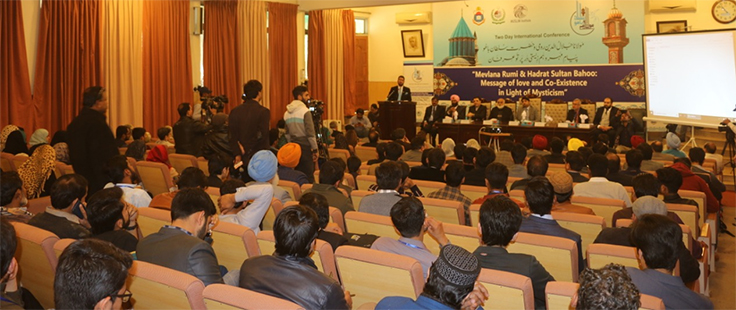
|
|
Books about teachings of Mevlana Rumi ؒ in modern languages have reached to the number of more than three hundred since 1998, and many of them are among best-seller books. The numerous English novels and books written on character-building and several other mystical writings are somehow directly or indirectly linked to Masnavi of Mevlana Rumi ؒ. From diplomatic perspective, this sitting is an indication towards the establishment of love, peace and universal brotherhood. Seven centuries ago, Mevlana Rumi ؒ placed a special effect on scholars especially those of Indian subcontinent through his verses. People of Pakistan are greatly influenced by the teachings of Mevlana Rumi ؒ. And one of the great examples of such influence is Allama Iqbal who used to consider him as his spiritual mentor.
The fundamental principles and doctrines of the state of Medina were based on the notion of co-existence between various religions. When we find common grounds for building relations, it leads to the development of love for humanity and brotherhood. The philosophy of Sufis creates cohesion and unity among individuals of a society.
|
|
|
The way Islam has presented this message, it has been engraved in the hearts of people and they are acting upon this philosophy for centuries. The great personalities of Mevlana Rumi ؒ and Haḍrat Sultan Bahoo ؒ , they have the common message of love for humanity and solving the problems through dialogue. When the passion of love is born in our hearts, it automatically vanishes all the evils.
Mevlana Rumi ؒ Says, being a candle is not easy, in order to give light, it has to burn first. The importance of world peace has been emphasized by Mevlana Rumi ؒ.
Neither I am me, nor you are you, nor you are me.
Also, I am me, you are you, and you are me.
We have become one, in such a way,
That I am confused whether, I am you, or you are me.
Turkish poet Yonus Emre says:
Come, let us all be friends for once,
Let us make life easy on us,
Let us be lovers and loved ones,
The earth shall be left to no one.
|
|
|
|
First Academic Session
|
|
|
First Academic session of the conference was chaired by Prof. Dr. Naushad Khan (Acting Vice Chancellor, Islamia College University, Peshawar). Dr. Mohammad Mehdi Naseh (Professor, Ferdowsi University, Mashad, Iran), Dr. Ajaib Singh Chatha (Chairman of Kalm Foundation, Canada), Dr. Syed Ghazanfar Ahmed (Member Sub-committee of HEC for Social Sciences & Incharge Research Facility Centre, Faculty of Islamic Studies, University of Karachi), Prof. Dr. Dhanwant Kaur (Additional Director, Baba Farid Center for Sufi Studies, Punjabi University Patiala, India) and Dr Amber Yasmin (National University of Science & Technology, Islamabad) presented their papers and shared their views in the session. Dr. Uzma Zareen Nazia (Assistant Professor Persian Department, University of the Punjab) moderated the proceedings of the session.
Brief summary of views expressed by speakers is observed as under:
|
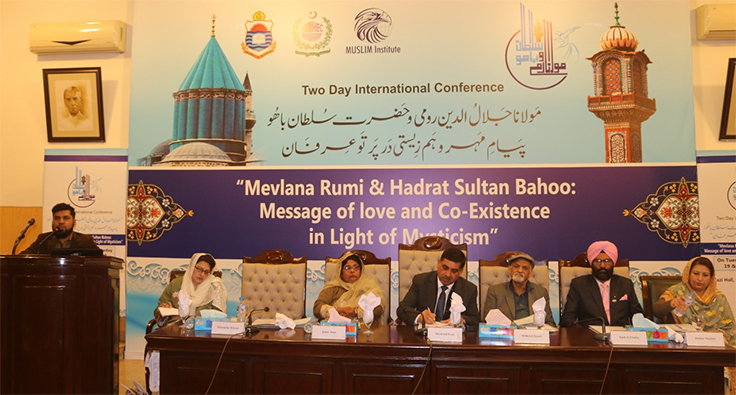
(From left) Dr. Syed Ghazanfar Ahmed (sharing his views), Dr. Uzma Zareen Nazia, Prof. Dr. Dhanwant Kaur, Prof. Dr. Naushad Khan, Dr. Mohammad Mehdi Naseh, Dr. Ajaib Singh Chatha and Dr Amber Yasmin.
|
|
It is not obligatory to be a philosopher or poet for understanding the teachings of Haḍrat Sultan Bahoo ؒ and Mevlana Rumi ؒ. Real source and essence of mārifat or Irfan (recognition of God) is love, which Almighty Allah (ﷻ) pours into the heart of Salik and ārif. To achieve this, he adopts the way of Saluk and mārifat. Irfan is based upon love as stated by Shaikh Sa’adi:
به جهان خرم از آنم که جهان خرم ازوست
عاشقم بر همه عالم که همه عالم ازوست
I Find in Nature my bliss, for Nature is the bliss of God.
Love I the entire earth; entire earth is of God.
Mevalana also considers his Mathnavi as source of Wahdat-e-Haq (unity of God).
Mevlana Rumi ؒ and Haḍrat Sultan Bahoo ؒ believe in the fact that all creations are under the influence of Divinity. Likewise, Haḍrat Sultan Bahoo ؒ is Ashiq-e-Haq. There are number of secrets hidden in his name. No wisdom can encircle the eminence of Haḍrat Sultan Bahoo ؒ. He says about himself:
“I am the falcon of Omnipresence, and a fly can’t exist at this place”.
|
|
|
Self-purgation means elimination of intellectual evils and purification of human soul from the misdeeds which hinder spiritual growth. According to Mevlana Rumi ؒ, impurities in your inner self are spiritual disorders. Unless you get rid of these disorders, you cannot move along the levels of spiritualism. These mystics conveyed this message to masses in public language. Haḍrat Sultan Bahoo ؒ says:
At the beginning, I was four (myself, murshid, prophet, and god), then myself annihilated in rest of three, after that stage I was annihilated in two and at last annihilated in one (god). Then I became part of you and you became me, at last I became you.
When a person negates oneself, he attains the level of Tawheed as mentioned in the verse:
وَنَحْنُ أَقْرَبُ إِلَيْهِ مِنْ حَبْلِ الْوَرِيدِ (سورۃ ق)
“and We are nearer to him than the hearts artery”
(Holy Qurʾān, 50:16)
|
|
|
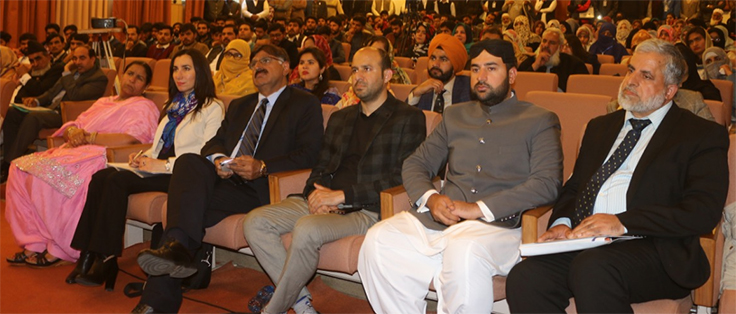
Participants view during the conference.
|
|
Haḍrat Sultan Bahoo ؒ advises us to enlighten the heart which illuminates with Divinity. Then, a person isn’t an ordinary entity. Rather, he attains the status of a beloved man of Allah (ﷻ).
Mevlana Rumi ؒ and Haḍrat Sultan Bahoo ؒ advocated propagation of moral values in the society especially among youth. Purpose of such conferences is the dissemination of moral education in every member of a community. Everybody is focusing on materialistic progress but no one is serious about learning morality.
To make a perfect human being, ethical development is mandatory. In past, society was a source of ethical education. However, dynamics of society have changed now and we need to impart education of ethics and morality in our educational institutions. Moral education mentioned in the Holy Quran and taught by mystics like Haḍrat Sultan Bahoo ؒ should be delivered to our youth.
|
|
|
It is an academic debate whether time creates leaders or leader creates time. Majority of the scholars and researchers are of the view that these are the leaders who create the time. Both Mevlana Rumi ؒ and Haḍrat Sultan Bahoo ؒ were the great leaders of humanity and were those who not only created the time but also moved the time. There is no denying of the fact that this life is very precious and given once, but it is equally precious to understand that how to spend this great life so that your name remains alive after your physical death. The message of both these Sufis carries the notion of living forever.
There are three stages of mārifat; understanding the universal realities, comprehending the universal phenomena and appreciating the reality of universal entities. There are five universal realities; God, entity, time, space and day of resurrection. Allah Almighty (ﷻ) knows about these realities. Regarding universal realities, spiritual scholars have stated that you can understand the universal phenomena by taking the example of traffic which is continuing on the ground as well as in the air. Therefore, universal phenomena are also following an order. It is imperative to have knowledge about all the three stages of mārifat. If someone is deficient about these stages, his mārifat is incomplete.
|
|
|
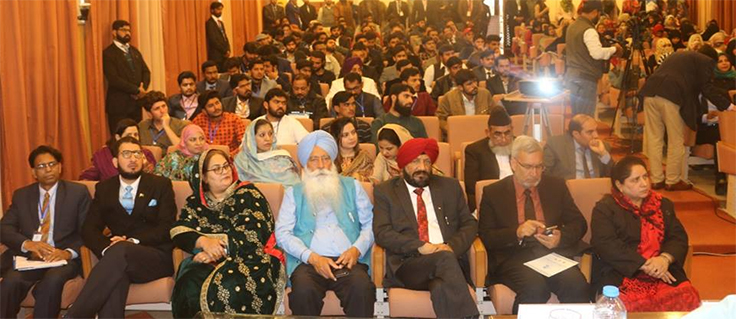
Participants view during the conference.
|
|
Second Academic Session
|
|
|
Second Academic session of the conference was chaired by Prof. Dr. Muhammad Nasir Afzal (Vice Chancellor, University of Sahiwal). Prof. Dr. Saleem Mazhar, Dr Muhammad Safeer (Head of Persian Department, NUML Islamabad), Mr. M. A. Khan (Translator of Haḍrat Sultan Bahoo ؒ's works in English, Luton, UK) and Mr. Muhammad Azeem (Research associate, MUSLIM Institute) presented their papers and shared views in the session. Dr. Muhammad Sabir (Assistant Professor Persian Department, University of the Punjab) moderated the proceedings of the session.
Brief summary of views expressed by speakers is observed as under:
|
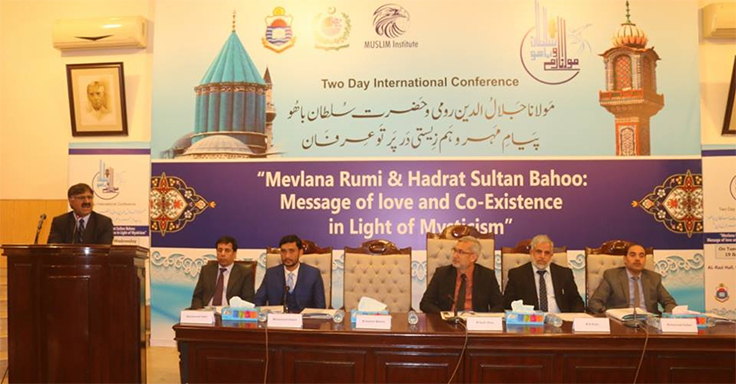
(From left) Prof. Dr. Saleem Mazhar (sharing his views), Dr. Muhammad Sabir, Mr. Muhammad Azeem, Prof. Dr. Muhammad Nasir Afzal, Mr. M. A. Khan, Dr Muhammad Safeer.
|
|
Besides Punjabi Abyat, Haḍrat Sultan Bahoo ؒ’s teachings have not been explored by the Muslim world in general and our academics in particular. One of the main reasons is the inability to understand the actual meanings of spiritual terms used by Haḍrat Sultan Bahoo ؒ and the unavailability of original text to our academics, therefore, the amount of research conducted is insufficient. Moreover, some accessible books were translated and they translated only the literal meaning of those spiritual terms. However, these books were taught within certain households of the decedents of Haḍrat Sultan Bahoo ؒ. Hadrat Sultan Bahoo ؒ was ummi (unlettered), he was wali Allah by birth and described himself as of Awan tribe from the fort of Shorekot. He was known as Sultan Ul ārifeen and in many books, he described himself as shahbaz e lamakani (Falcon of La Makan). La makan is above sidtrual muntaha (lotus tree) and below Yahoot, which is the sacred state of Rasool Allah ﷺ. Lahoot is illumine of Allah Almighty (ﷻ). Haḍrat Sultan Bahoo ؒ’s emphasis was upon the contemplation of Ism e Allah zaat (personal name of Allah) and almost his entire literary work revolves around Ism e Allah zaat. As in his first poem he says:
Alif Allah as jasmine sapling, my murshid cultivated in my heart Hoo
Water of negation and affirmation irrigated every vein in every part Hoo
When it sprouted, it scattered fragrance in me Hoo
Forever live my murshid Hazrat Bahoo ra such was planted by thee Hoo
|
|
|
When Ism e Allah zaat influences the body and each hair on the body engages in the dhikr, calmness and contentment sets in same as when rose bud opens and it scatters fragrance. Not forgetting, it will not release fragrance prior to its opening up, same as body cell will not be triggered to open membrane of the cell until the DNA attains certain conditioning from one’s heart or soul. It is worth pointing out that impact of our thought influences our DNA and if we think positive, we will be able to progress in positive manner and will be able to make a difference to our society and our fellow living being as well as our environment. The whole purpose of contemplation of Ism e Allah zaat is to access manifestation of Allah Almighty (ﷻ) in order to attain self-recognition.
In a nutshell, we must start research on spiritual dimension of Islam and adduce it in our education system not mere symbolically but through research and also study its impact upon our mental health as well as welfare. Without properly introducing spirituality within our education system we will only be paying lip service and no more.
Literal meaning of Faqr is poverty. However, mystics denote it to resigning oneself to the will of Allah (ﷻ) and shunning the dependence on materialistic resources. Self-assurance is the attribute of Allah Almighty (ﷻ) and it can only be developed in a human when he unites his-self with Divinity and rejects all the worldly splendor and materialism. Mystics deduced the meaning of Faqr from Holy Qurʾān and the sacred life of Holy Prophet (ﷺ). Holy Prophet (ﷺ) says:
اَلۡفَقۡرُ فَخۡرِیۡ وَالۡفَقۡرُ مِنِّی
“Faqr is my pride and Faqr is from me”.
|
|
|
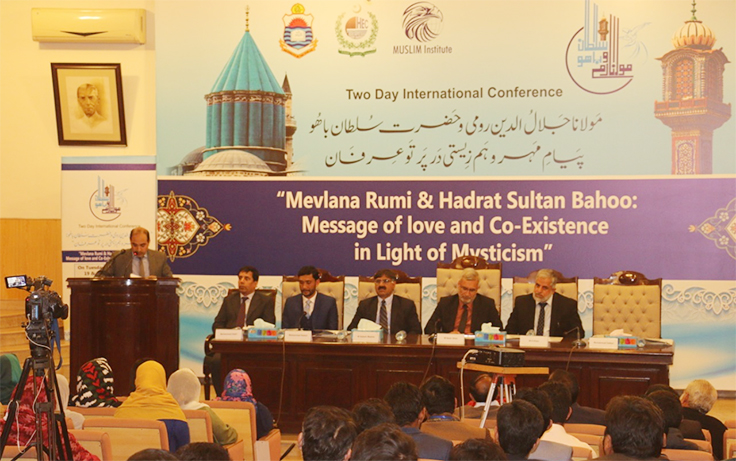
Stage view during the conference.
|
|
Words of both Mevlana Rumi ؒ, and Haḍrat Sultan Bahoo ؒ contain universality. These are the personalities who upheld truthfulness in every era. Mevlana Rumi ؒ, in his poetry especially Masnavi and Haḍrat Sultan Bahoo ؒ, in his all books especially Ain-ul-Faqr and Muhik-ul-Faqr, explained in detail the topic of Faqr.
Haḍrat Sultan Bahoo ؒ says:
کوڑا تخت دنیا دا باھو تے فقر سچی بادشاہی ھو
Wordly throne is a deceit while Faqr is the real Kingship.
|
|
|
He again opines that Faqr is the light (illumine) whose name is Sultan ul Faqr, who always remain infront of Allah Almighty (ﷻ) and remain in His bestow. It becomes omnipotent and every place is within his reach.
While Mevlana Rumi ؒ says that Faqr is referred as pride because at its very first stage one has to shun the worldly desires. About which Haḍrat Sultan Bahoo ؒ enlighten us that:
Until one’s beings annihilates in Hoo’s Essence, he remains lowest Hoo
Within Divine essence no mortal form left, then Sustainer you will ascertain dearest Hoo
Hoo is inner and Hoo is in outer from where Hoo could access by me Hoo
Within whose heart is worldly love ‘Bahoo’ person of spiritual excellence he could never be Hoo
|
|
|
|
Mystical Music Session
|
|
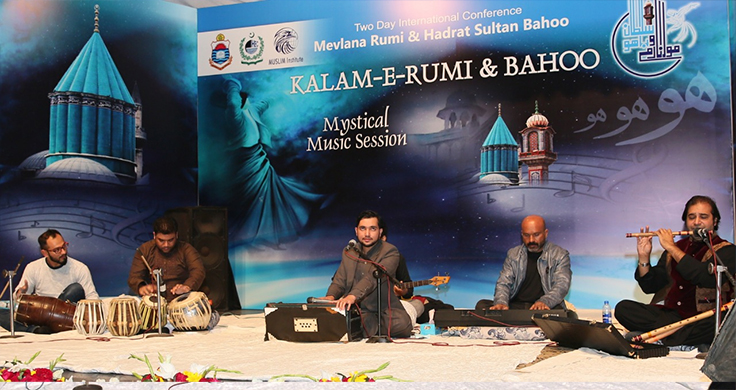
Stage view during the musical session of conference.
|
|
After inaugural and two academic sessions of the conference, a ‘Mystical Music Session on Kalam-e-Rumi & Bahoo’ was also organized. In this Mystical Music Session, Raja Hamid Ali presented Kalam-e-Rumi & Bahoo. Researchers, scholars, students, university professors, lawyers, journalists, social activists and people from different walks of life participated in the event.
|
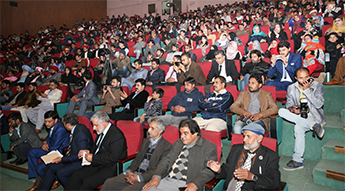
Participants view in musical session of conference.
|
|
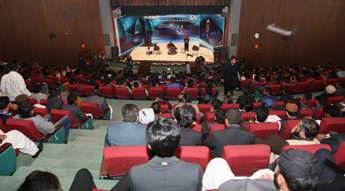
Stage and hall view in musical session of conference.
|
|
|

Stage view during the musical session of conference.
|
| |
|
|
|
|
|
| |
|